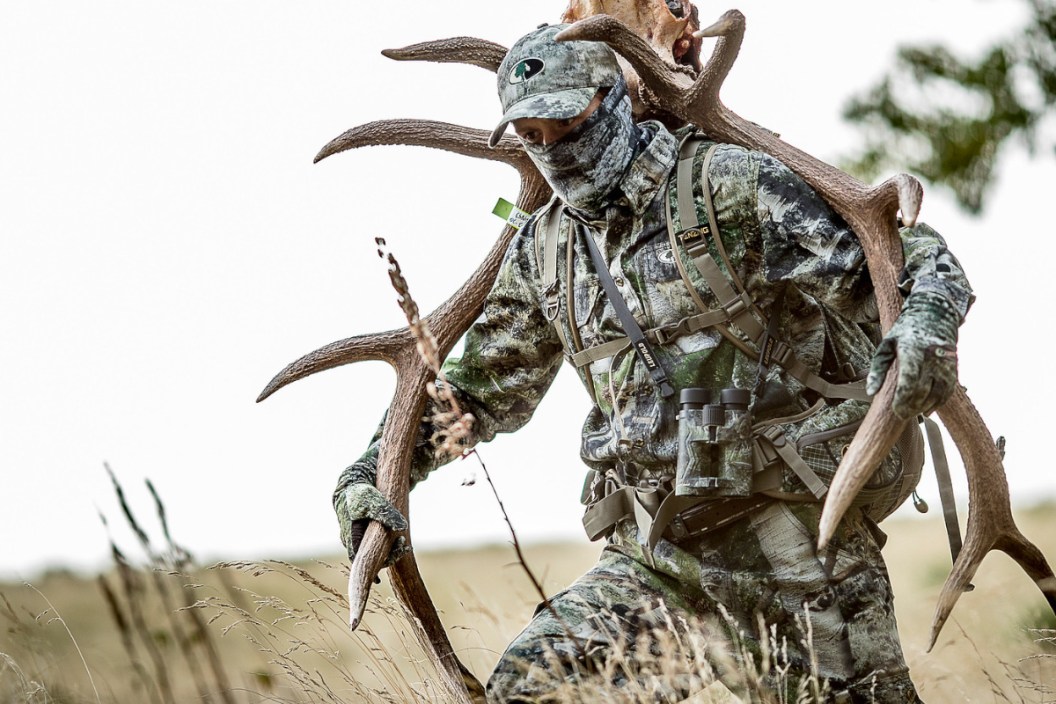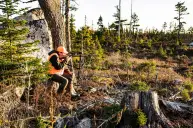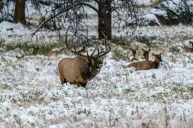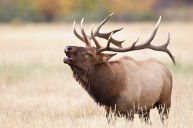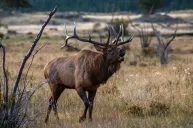Many elk hunters share a similar story of frustration. Year after year, they apply for nonresident elk tags in the same state with no success, growing more frustrated with each failed attempt to draw a tag. Wouldn't it be nice if instead of waiting for Wyoming or Montana to draw your name, you could just get out and hunt some prime elk habitat this season?
None of us are getting any younger, which means a DIY-style elk hunt would need to happen sooner rather than later. Not to mention, many of those drawings carry expensive entry fees for smaller animals like deer and pronghorn antelope, let alone a hunting license for one of the most coveted big-game animals of all time.
Whatever your reason for not wanting to wait may be, this definitive list of states that offer over-the-counter elk tags should inspire some easier routes to a real elk hunt in the near future. However, these are the only states that offer these tags to nonresidents. We have the resident-specific lists at the bottom.
Colorado
Arguably the best western state in North America to go for an over-the-counter elk hunt is Colorado. Heck, they may be the best state overall for any hunt thanks to their robust elk population and plethora of National Forests and other public hunting areas. However, we advise elk hunters to make sure they are reading the fine print before they buy because some of Colorado's OTC elk hunts are restricted to private land or public land only. Hunt Unit 82, for example, has valid archery season licenses for either sex or cow elk on public lands only. OTC tags are available there for rifle season only on public lands for the second and third seasons. Just be aware that hunting pressure is likely going to be greater on public lands in OTC units than it will in units that require drawn tags. Be ready to do a fair amount of research to find the best hunting areas with the highest success rates.
Idaho
The Gem State has a healthy elk herd, but there have been some concerns about overcrowding on public lands in recent seasons. Idaho Game and Fish still plans to sell OTC general season permits, but starting last year, nonresidents are "limited to 10-15 percent of the total hunters in each elk zone or deer unit based on hunter participation estimates averaged over the last five years." Do not let that discourage you, though, as it only reduced the number of tags sold by about 600. However, you should still plan to buy early each year as soon as tags go on sale in December to increase the likelihood of securing a hunt in a better area.
Utah
The primary reason more people don't take advantage of Utah's OTC opportunities is because they come from leftover permits from various big-game drawings. These are almost always going to be in less desirable areas with more competition. However, drawing for premium big-game hunting tags in Utah is often difficult, making this the only viable option for many hunters in the Beehive State. The tags go on sale around mid-July and are first come, first served. So, the earlier you jump in to buy, the better the permit you are likely to land. These hunts may not be for everyone, but for the hardcore archery hunting enthusiast or muzzleloader hunter who likes a challenge, Utah's OTC elk tags undoubtedly deliver.
Oregon
One of the more unique things about Oregon is the opportunity to pursue two different elk subspecies. You can hunt the Roosevelt elk in the western part of the state and Rocky Mountain elk in the eastern portion. In general, it's usually easier to get a nonresident OTC firearm tag than an OTC archery tag. If you can gain access to certain private land areas, Oregon also sells a private land-only OTC antlerless elk damage tag for areas where the animals cause serious property damage. If you just want meat and don't care about harvesting a large bull elk, this is certainly a viable option. The Oregon Department of Fish and Wildlife only asks hunters to secure permission to hunt before purchasing these tags, as they don't assist hunters in finding a place to hunt.
Washington
This state is a bit unique in that most elk tags are OTC anyways. The only hard part is deciding where to hunt and what weapon to use. If you buy archery elk, you can't use a firearm, and rifle hunters can't use a bow. Washington also splits their state in two halves—East and West—and you're required to choose a side to hunt. West offers better chances at a bigger bull, especially during bow season. Unfortunately, public land access is a bit more limited. East has more public land opportunities for the first-time elk hunter, but much of that land features spike bulls only, especially in the southeast corner. Do some thorough research to determine what tag and area is best for you before you buy, and remember side you buy a tag for is the side you're married to, as you can't cross over.
States that offer OTC to residents only
There are a few states that offer OTC opportunities for elk, but only to residents. If you are a recent transplant to one of these places, make sure to look up the definition of resident first, as some states require you to maintain a permanent address within their borders longer than others. Wyoming, for instance, requires residence for a full 180 days before you're considered a resident. So, if you move there in late summer, odds are you are going to miss hunting the elk rut. The list of states that offer resident-only OTC elk tags is short—Montana, Arizona, and Kentucky—but the latter two only offer tags as a control effort for elk that have spread beyond areas the respective states don't want them. Odds aren't typically great for these hunts.
For more outdoor content from Travis Smola, be sure to follow him on Twitter and check out his Geocaching and Outdoors with Travis YouTube channels.
